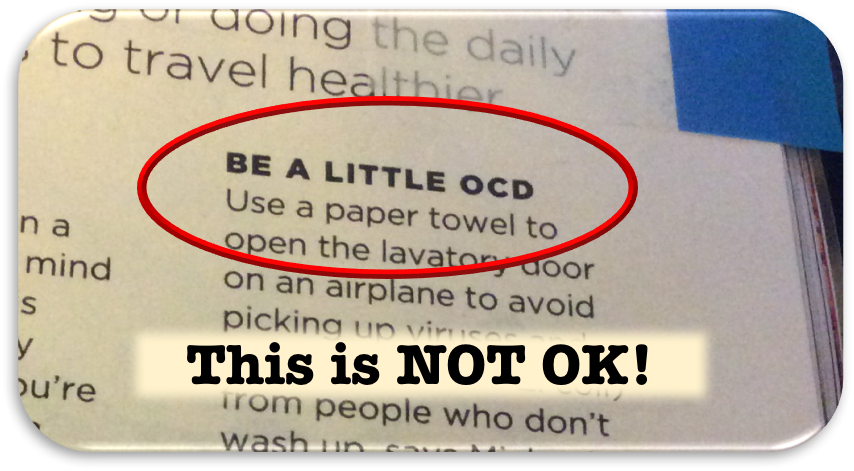When my mom read last week’s post, titled “Pokemon GO.C.D.,” the first thing she asked me was if I would be offended if someone else used that title. Was it too close to the phrase I hate so much - when people claim to be “so OCD” about everything from work habits to bookshelf organization?
My honest answer was that it depends on how it’s being used. When I thought of the title, I was thinking about how my clinically diagnosed OCD affects both my ability to make friends and my Pokemon Go play style. In a game with plenty of options from taking over gyms to doing raids with friends, I tend to do the same things over and over, just like I love listening to the same songs, reading the same books, and watching the same movies. I enjoy the way people in the community are very interested in pokemon, so I can talk about the creatures and the franchise for a long time without being thought of as boring or weird. That, in turn, helps me make friends to do these same activities with.
What I definitely didn’t mean is that my experience in Pokemon Go represents the gamut of all OCD has to offer. For every time my OCD has helped me focus on a thing I love or influenced a way of behaving in a fun activity like Pokemon Go, there are many more times it’s influenced me in a bad way.
Over the years, I’ve learned to be positive about the way my mind works and think of positive things it can do for me. It’s easier to think like that now that I’m in a place in my life where I’ve done away with most of the compulsions after many years of therapy and hard work.
All of that is so easily erased when people say “I’m so OCD about [insert thing here].”
When I hear someone say “I cleaned a stain off my stove today, I’m so OCD” or “I had an OCD moment today, I got so mad when my books fell over,” it trivializes the experience that I and so many other people with OCD are living with. OCD isn’t a moment, it’s a lifetime. It’s something I’ll never know life without, even if I’ve found so many coping strategies and ways to get through days that most of the time, people wouldn’t necessarily know by being around me.
When I called my last blog post “Pokemon GO.C.D.,” I was trying to avoid exactly this, and I hope you didn’t take it that way. I meant to talk about my experiences as a Pokemon Go player with OCD and make a pun along the way, but I don’t mean to say that my friends or any other players not living with OCD who keep spreadsheets about Pokemon Go and have very specific goals that they focus intensely on are “so OCD.” I prefer to not even use the word “obsessed,” if I can help it. Instead, I say that my friends are focused on their goals, very interested in organizing their pokemon a certain way, preoccupied with specific things, or have strong preferences.
Playing Pokemon Go in a certain way is something my friends choose to do for fun, not something that feels like it’s eating away at their sanity if they don’t have a specific pokemon doing the exact thing they want. It’s such a different story from the OCD that plagued my childhood that it’s hard to compare, and yet, so many people use the phrase “so OCD” to hyperbolize. It’s easy to say, like if I say “I have a million things to do today” when I’ve got a dozen items on my to-do list, but this kind of hyperbole is harmful and makes people with OCD feel two things that are very demoralizing.
First, it makes my struggle with OCD feel like a joke. If people can beat their “so OCD” moments so easily, what does it say about me that it takes me so long and feels so exhausting? It makes me feel stupid and incapable of doing things that other people find so easy. Second, and more hurtful, it isolates me from the people who believe this. If people are interpreting OCD to mean taking too long to choose an outfit, they are showing they have no understanding that it really means having to take a certain number of steps in each sidewalk square and worrying for hours if I do it wrong, or one of infinite other anxiety-provoking obsessive-compulsive thought patterns. It takes away a part of what might have been my support system and shows me that this is not a person to trust.
I don’t think people say this phrase malevolently. It’s an easy mistake to make, and it’s sometimes led to productive discussions where a new friend and I both learn from each other and our support and understanding of each other actually grows stronger. But in cases where people don’t want to listen or insist that I’m wrong about how to interpret my own brain, it’s divisive and tends to make me dislike a person based on their lack of willingness to be respectful.
I apologize if any readers took my title from last week the wrong way. I started this blog to educate people about living with OCD, and just like any other person, I make mistakes. I don’t regret using the title as I intended it, but I wanted to make sure to clarify exactly what I meant and use my potential mistake to educate just like I do with my successes. Thank you so much for following, and I look forward to sharing more with you!
Ellie, a writer new to the Chicago area, was diagnosed with OCD at age 3. She hopes to educate others about her condition and end the stigma against mental illness.


